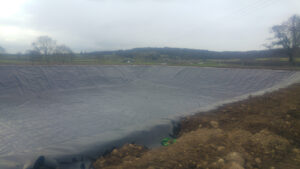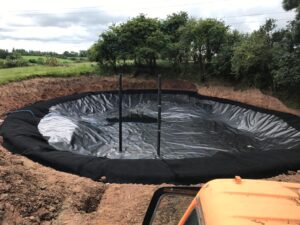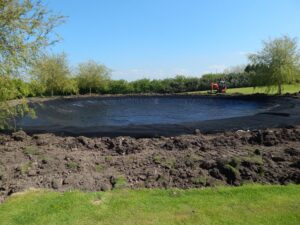On the patchwork of British farmland, slurry lagoons stand as vital reservoirs, managing organic waste essential for agricultural productivity. The use of slurry lagoon liners has emerged as a boon, offering an array of benefits that amplify farm efficiency while promoting responsible waste management.
Environmental Protection:
Slurry lagoon liners serve as protective shields, containing organic slurry to prevent leaching and seepage into the soil and water sources. This safeguarding measure shields the environment from potential harm, preserving soil quality and averting water contamination. The liners play a pivotal role in upholding the lush landscapes and safeguarding the ecosystem.
Odour and Emission Reduction:
By creating sealed environments, these liners help curtail odours and emissions emanating from stored organic materials. Gases like ammonia and methane, notorious for their pungent odours and environmental impact, are mitigated, benefitting not just the local communities but also aligning with stringent emission control regulations.
Effective Nutrient Management:
With secure containment facilitated by slurry lagoon liners, farmers can efficiently manage nutrient-rich slurry. The controlled application of retained slurry acts as a valuable natural fertiliser, enriching the soil and fostering robust crop growth. This sustainable nutrient management strategy aids in reducing reliance on synthetic fertilisers.
Groundwater Protection:
Unlined slurry lagoons pose a risk of contaminating groundwater through seepage. Lining systems act as bulwarks, impeding seepage and ensuring the contained slurry remains within the lagoon. This preventive measure safeguards groundwater quality, preserving the purity of water sources crucial for both farm and community needs.
Long-Term Economical Benefits:
Though the initial installation of slurry lagoon liners incurs costs, the long-term advantages far outweigh them. Reduced environmental impact not only ensures compliance with regulations but also potentially circumvents fines. Moreover, efficient nutrient management translates into healthier crops, yielding financial gains for farmers in the long run.
Conclusion:
Slurry lagoon liners epitomise sustainable agricultural practices by encapsulating environmental protection, efficient waste management, and enhanced crop yields. They serve as barriers, shielding the environment from harmful pollutants and supporting responsible waste handling. The contribution of these liners to preserving soil quality, averting groundwater contamination, and fostering judicious nutrient use cannot be overstated. As farming practices evolve towards eco-friendly solutions, integrating slurry lagoon liners stands as an essential step towards sustainable and responsible agricultural growth in the British farming landscape.
To find out more about our products and services and how we can help you, please contact us using the below –
Tel: 01695 228626
Email: enquiries@enviroseal.co.uk





